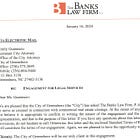Greensboro City Councill; Allen Johnson's "National Guard” Editorial that Shafted Carla Franklin
Allen Johnson and the News & Record have done their job. They sensationalized a single candidate forum question about federal troops into a front-page story, framing it as the ultimate litmus test for local leadership.
Here’s why;
1. The Media Has Decided What’s Important For You; You Must Decide For Yourself.
The editorial insists the question was “not especially remarkable,” yet devoted significant space to analyzing the answers and, most pointedly, the “conspicuous silences.” By declaring “What could be more local than troops on city streets?” and highlighting the dramatic, historical context of 1969, the paper has placed this hypothetical crisis at the center of the election. This is a choice. It elevates a single, dramatic moment over the complex, ongoing work of governance.
This intense editorial and news push, arriving in the final days before the primary, blew up Carla Franklin’s chances of surviving the primary. By elevating a single, emotionally charged hypothetical to the defining issue of the campaign, the News & Record gambled with its credibility.
Rather than enlightening voters, Johnson bred a backlash on his designated targets and manipulated the election.
2. They’ve Framed Nuance as Failure.
The four candidates who declined to answer (Perkins, Franklin, Ignac, and Smith) were not celebrated for thoughtful caution. Their “nonanswers were telling,” and their call was labeled “curious.” The message is clear; give us a soundbite or be prepared for a headline questioning your judgment.
3. The Editorial Itself Proves the Distraction is the Point.
Johnson admits that “there are so many other ways” candidates affect our lives, listing “local tax rates to zoning disputes... homelessness, a housing shortage and chronic poverty.” Yet, the paper chose to lead with the troop question. He even acknowledges that the candidates “should be evaluated on more than their answers (or lack thereof) to one question.” This contradiction reveals the core problem; media incentives often prioritize drama over depth. The forum “stirred some useful discussions,” but more importantly, it “generated a front-page headline.”
The piece laments that “voters seem more inclined to have opinions than to cast votes.” The News & Record ends by stating, “If you weren’t paying attention before, maybe you are now.”
They are right. But we should be paying attention to the fact that a media-driven “gotcha” moment overshadowed the real, daily needs of our city and altered the outcome of the primary.
TBS, a critical poem I sent to our to local press on October 1st, pointing out how they are failing the public by keeping most uninformed;
The Omission Loop
The councilman speaks of a vacant store,
A deal that’s been done many times before.He talks with the owner, the papers report,
But carefully missing the key support.
The press reports his words as fact,
Ignoring every telling act.The owner is a donor, see,
A conflict plain as it can be.He gives the candidates the cash, they give him the keys,
To city-owned futures and lucrative fees.
The board is all insiders, a permanent clique,
The mayor, the manager, a political fix.They vote for the grants that flow to their friends,
A cycle of profit that never ends.
But silence is the press’s art,
They’ll never play the central part.They print the “what,” they hide the “who,”
So you can’t see what’s truly due.
The press prints the press release, shallow and thin,
Hiding the game that the insiders are in.They won’t name the names, they won’t connect why
The same few get rich while the public just sighs.
So the building stays empty, a hollowed-out sign,
Of a city for sale on a well-greased line.The officials are bought, and the press looks away,
That’s how the insiders profit each day.
The reason that you do not know?
The press decides to keep it so.







